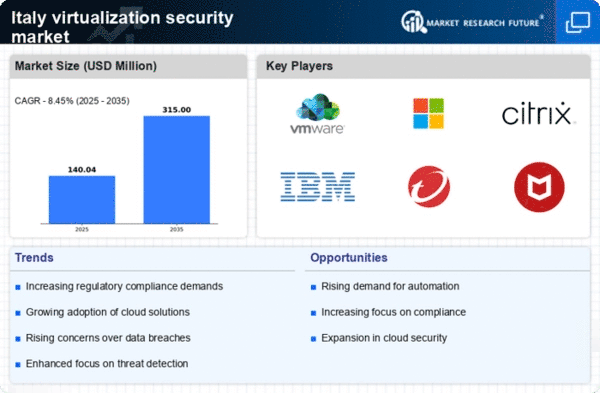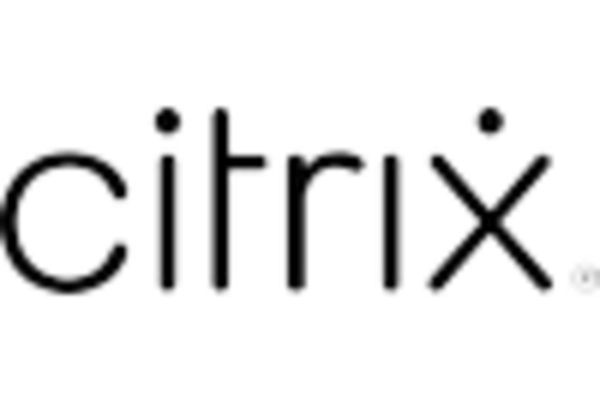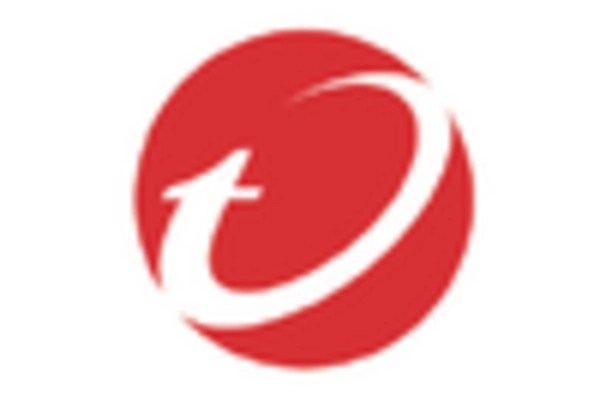Shift Towards Remote Work
The virtualization security market in Italy is influenced by the ongoing shift towards remote work. As organizations adopt flexible work arrangements, the reliance on virtualized environments has surged. This transition necessitates enhanced security measures to protect sensitive data accessed remotely. According to recent studies, approximately 70% of Italian companies have implemented remote work policies, which has led to an increased focus on securing virtual infrastructures. Consequently, the demand for virtualization security solutions is expected to rise as businesses seek to mitigate risks associated with remote access. This trend highlights the evolving nature of work and its impact on the virtualization security market.
Rising Cybersecurity Threats
the virtualization security market in Italy is growing due to more frequent and sophisticated cyber threats.. Organizations are recognizing the need for robust security measures to protect their virtual environments. In 2025, it is estimated that cybercrime could cost businesses globally over $10 trillion annually, prompting Italian companies to invest in virtualization security solutions. This trend indicates a heightened awareness of vulnerabilities associated with virtualization technologies, leading to a surge in demand for security products and services. As businesses transition to virtualized infrastructures, the necessity for comprehensive security frameworks becomes paramount, driving the virtualization security market forward.
Regulatory Compliance Pressures
In Italy, regulatory compliance is a significant driver for the virtualization security market. The European Union's General Data Protection Regulation (GDPR) mandates strict data protection measures, compelling organizations to adopt virtualization security solutions. Non-compliance can result in fines up to €20 million or 4% of annual global turnover, which incentivizes businesses to prioritize security investments. As companies strive to meet these regulatory requirements, the demand for virtualization security technologies is likely to increase. This trend suggests that organizations are not only focused on compliance but also on enhancing their overall security posture, thereby propelling the virtualization security market.
Integration of AI and Machine Learning
The integration of artificial intelligence (AI) and machine learning (ML) technologies is emerging as a key driver in the virtualization security market in Italy. These advanced technologies enable organizations to enhance their security measures by automating threat detection and response processes. In 2025, it is projected that the AI in cybersecurity market could reach $38 billion, indicating a growing trend towards intelligent security solutions. As Italian businesses increasingly adopt AI and ML, the demand for virtualization security solutions that leverage these technologies is likely to grow. This trend suggests a shift towards proactive security measures, enhancing the overall resilience of virtual environments.
Increased Investment in IT Infrastructure
The virtualization security market in Italy is benefiting from increased investment in IT infrastructure. As organizations modernize their IT environments, they are prioritizing security to protect their virtualized assets. In 2025, IT spending in Italy is expected to reach €35 billion, with a significant portion allocated to security solutions. This investment trend indicates that businesses are recognizing the critical importance of securing their virtual environments amidst evolving threats. As companies enhance their IT infrastructure, the demand for virtualization security solutions is likely to rise, driving growth in the market. This trend underscores the necessity of integrating security into the broader IT strategy.
















